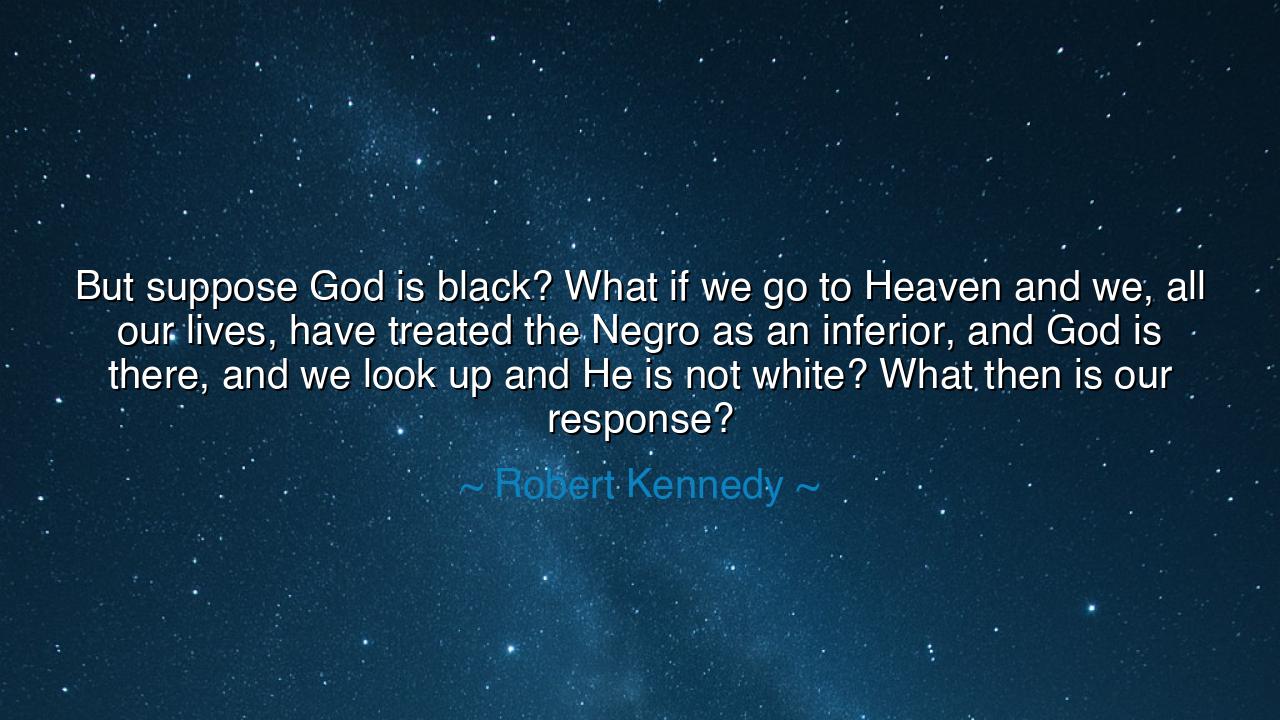
But suppose God is black? What if we go to Heaven and we, all our
But suppose God is black? What if we go to Heaven and we, all our lives, have treated the Negro as an inferior, and God is there, and we look up and He is not white? What then is our response?






The words “But suppose God is black? What if we go to Heaven and we, all our lives, have treated the Negro as an inferior, and God is there, and we look up and He is not white? What then is our response?” come from Robert F. Kennedy, spoken in the shadow of apartheid and racial injustice, and published later in his essay “Suppose God Is Black.” In that journey through South Africa in 1966, Kennedy confronted not only political systems but moral imaginations — the images we carry of the divine, and how those images may blind us to justice.
In that speech and essay, Kennedy recounts a challenge he heard from a student: that many churches in South Africa defended apartheid as a moral necessity, claiming that black Africans should not pray alongside whites, because “God created Negroes to serve.” To this, Kennedy answered by turning their assumptions upside-down, by asking the provocative question: what if God were black? What if, when we ascend, we find that the image of God is not one we ever imagined — and that our prejudices, our assumptions, our hierarchy of color, were all built on a false foundation?
At the heart of Kennedy’s question lies a moral mirror: it forces us to examine whether our notions of divinity are contaminated by human prejudice. If we have for years regarded one people as inferior while worshipping a God in our image, then we risk standing before that God in innocence — and failing to recognize the divine because it differs from our expectations. Kennedy’s “what then is our response?” challenges us to see that our worship, our theology, and our ethics are bound together: to dehumanize others is to limit God.
The profound power of his question is that it does not offer a ready-made answer. It leaves silence in the room — a silence pregnant with shame, reflection, and possibility. In the LOOK magazine article he published afterward, Kennedy says there was no answer — “only silence.” But that silence is itself part of the teaching: when doctrines and prejudices fall away, we are left with the human soul before mystery, and must choose whether humility or hubris will fill the void.
History offers echoes of this teaching in lives that refused to honor God only in the familiar image, but reached across difference. Consider Martin Luther King Jr., who taught that God created all of humanity in the divine image, and that racial separation wounds the soul and insults the Creator. Or Frederick Douglass, who taught that slaves had souls and dignity every bit as divine as any master. Their struggles were not simply political — they were theological, demanding that God’s grace extend beyond the image that human prejudice had carved.
Emotion stirs in this teaching because it dismantles comfort. It forces each of us to confront whether our spiritual categories protect injustice. It means that when we see a human face unlike our own, we must not recoil — for that face may be closer to God than we dared imagine. Kennedy’s words create moral urgency: the way we treat our neighbors, especially those we look down upon, cannot be separated from how we conceive God.
The lesson is unmistakable: repudiate prejudice, expand your vision of the divine, and let empathy reshape your faith. Do not confine God to your cultural expectations; instead, ask whether your beliefs diminish dignity. In life, take concrete steps: listen to voices unlike your own, dismantle racial hierarchies in your community, and treat every person as bearer of the divine. And in your theology, allow humility to replace certainty, wonder to replace comfort, and justice to guide the image you hold of God.
In the echo of Kennedy’s question — “What then is our response?” — we find both accusation and invitation. Let it wake us to the truth that faith without justice is blind, and worship without humility is false. May we live in such a way that, should we one day look up and find the Divine beyond our expectation, we will recognize Him — not by color, but by love.






AAdministratorAdministrator
Welcome, honored guests. Please leave a comment, we will respond soon